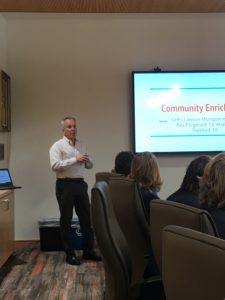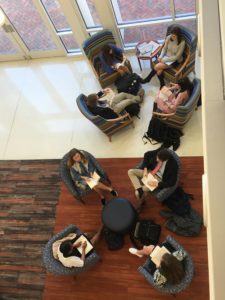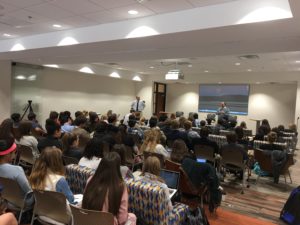2018 Global Health Fellows’ Retreat: Friday Morning Blog Post by Andrew Thetford
Our first Global Health Retreat of 2018 began at 8:15 sharp, when the ‘18, ‘19, ‘20, and brand new ‘21 cohorts met on the upper floor of our new Massey Leadership Center with Mrs Goodson, Mrs. Hall, Ms. Nasimiyu, and our mentor and friend Dr. Bob Malkin, a professor of Biomedical Engineering at Duke University. We met Dr. Malkin in the summer of 2016 during our retreat to Duke and UNC, and Dr. Malkin has since proven to be very helpful in designing and helping to shape our intervention in Belize.
Previous to this retreat, the three older cohorts had split up into groups of different interests in an effort to cover all the different fields of aid that our projects in Belize could tackle. Groups included community enrichment, female empowerment, health and well-being, hygiene and sanitation, and technology. Each group had already presented to all of the older fellows, but the new ‘21s and Dr Malkin had yet to hear from any of the groups. For the older fellows, these presentations served to hone their public speaking and presenting skills and to receive feedback and constructive criticism from a public health expert; for the ‘21s, the presentations served to show them what the GHFs have been up to over the past few months and to introduce them to what the program is all about; and for Dr. Malkin, the presentations also served to enlighten him on the goings-on of the program. After each presentation, there was a brief Q&A session for each group, with Dr. Malkin providing very thoughtful insight with positive feedback and things to consider for each presentation/theoretical intervention.
Dr. Malkin had to be back at Duke by around 2 in the afternoon, so our time with him was brief but filled with lots of learning and important takeaways. After this rather intensive educational session, we played an icebreaker that involved gathering in a circle and passing around a beach ball that had questions written all over it. Questions ranged from “What’s your favorite toothpaste flavor?” to “What’s your favorite karaoke song?” and really helped to diffuse any discomfort that might have been present, especially in the ‘21s. To cap off the GHF morning, we split into groups: the ‘20s led the ‘21s in a discussion of the book Better by Atul Gawande- a classic introductory read for new GHFs, and the ‘18s and ‘19s discussed Dr. Malkin’s feedback and plans for the future until lunchtime.
Better Discussion Groups by Leila Jamali (2021)
After reviewing the presentations with Dr. Malkin, the sophomores and freshmen separated from the juniors and seniors. In the lobby of the Massey Leadership Center, we discussed the book Better by Atul Gawande, a surgeon who narrated about his experiences in the field. The sophomores and freshmen split up, each group with 2 freshmen and 2 sophomores, who had split up by section of the book. The sophomores asked us debatable questions about their specific sections and quotes, and our general thoughts on certain topics relating to the events in the book. When I was in Courtney and Ells’s group, we talked about the different ways doctors performed surgery during a war setting and how they were able to accomplish it as cleanly as possible. This topic really interested me, especially reading about the amazing things doctors are able to do in the field. The freshmen rotated through 2 of the 3 groups. We only did this for about 10-20 minutes before we had to go to lunch and continue the rest of our first retreat as Global Health Fellows.
Batten Civic and Global Leadership Program Focuses on Sea Level Rise by Ingrid Benkovitz (2019)
After enjoying lunch with one another, we ventured back to the Massey Leadership Center for the afternoon activities relating to sea level rise. It began with Mr. Nelson’s remarks and introduction to a short documentary, On the Chesapeake, about the effects that climate change and sea level rise has had on coastal areas off the Chesapeake Bay. The film had not only beautiful pictures and videos of our bay, but was also filled with shocking and often upsetting facts and statistics of what the future of our society could look like without change.
We then broke up into small discussion groups of about 10 students from all different grades and Fellows groups. We discussed a variety of articles that we had read, each outlining a different implication of sea level rise. We came back together and each group shared their major takeaways in front of all of the Fellows, directors, and a panel of adults with experience working to change the state of our environment and bay. My group, for example, explained the difference between a proactive and a reactive culture, as well as lifestyle changes we saw necessary. Others mentioned the extensive consequences of sea level rise or the difficulty of successfully implementing projects in places where many people do not believe in the cause. Each student was more enlightening than the last and the points brought up were thought-provoking, leaving me questioning and ready to learn more.
The panel that was present consisted of men and women from a wide range of occupations, from government workers to engineers, and they were eager to answer questions and help us understand what we can do to make change and inspire others to make change. Mr. Wetmore concluded the day with some closing remarks as we look forward to more work tomorrow!


